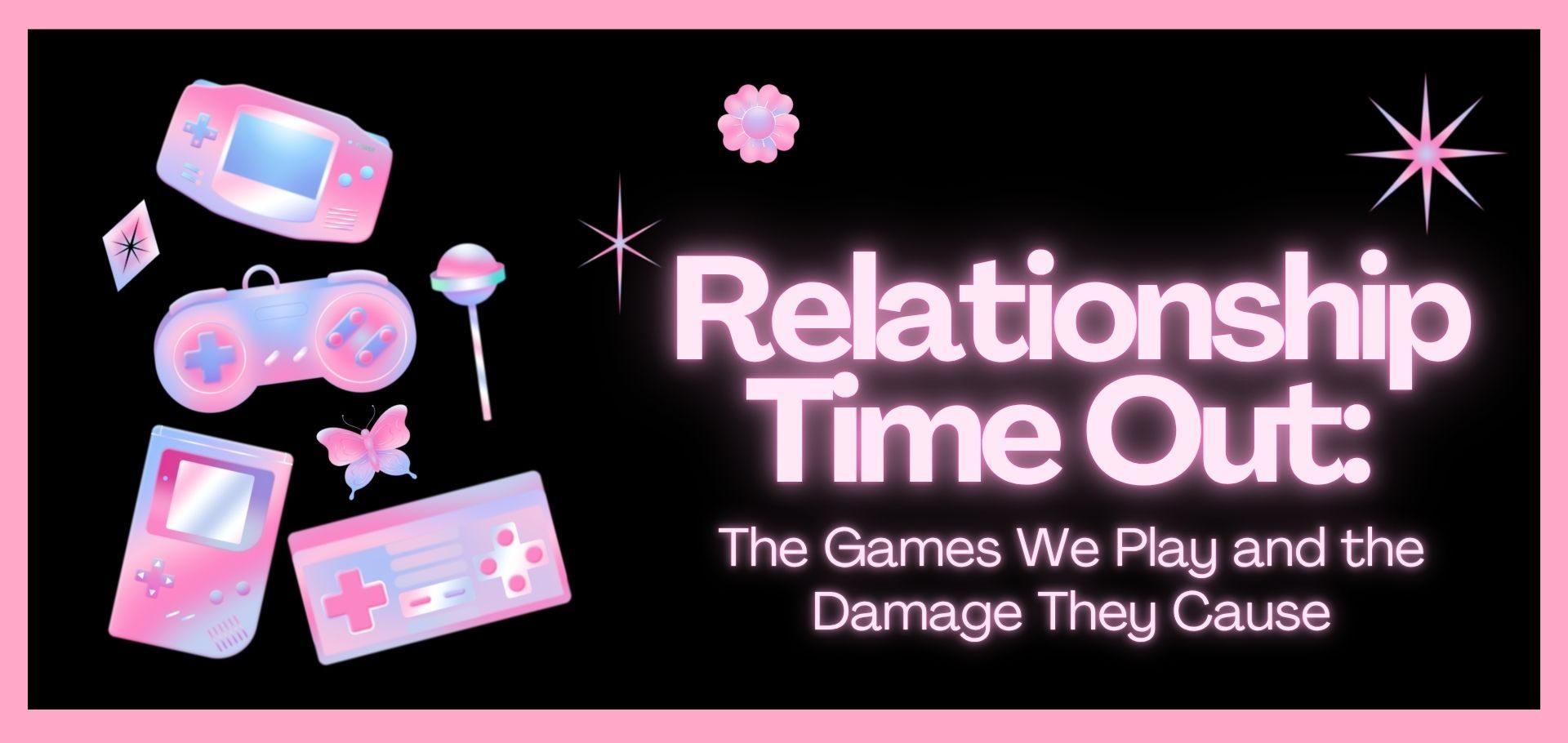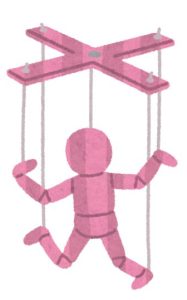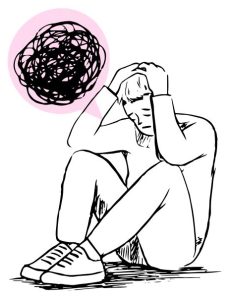
It’s time to stop playing games in our relationships. Everyone says, “Oh, I don’t play games” or “I wouldn’t let myself get played like that”, but honestly? Most of us have slowly slipped into them. Yes, in relationships; But also in friendships, at work, and even with complete strangers! Sometimes these manipulations are easy to spot. Example, the classic hot and cold. They’re all over you one moment and radio silent the next. Some, though, are so deeply ingrained in us that we don’t even notice we’re playing. What we need to ask society as a whole is, If we know it’s bad to play games… Why do we still do it?
Most of us have slowly slipped into them. Yes, in relationships; But also in friendships, at work, and even with complete strangers! Sometimes these manipulations are easy to spot. Example, the classic hot and cold. They’re all over you one moment and radio silent the next. Some, though, are so deeply ingrained in us that we don’t even notice we’re playing. What we need to ask society as a whole is, If we know it’s bad to play games… Why do we still do it?
Mind Games are the habits that we do that lack authenticity, aim to mislead someone else, and usually are a strategic tool for manipulation. They take power from the other person in the relationship, often leaving them confused and forced to question the relationship and the intentions of their supposed partner.
A healthy relationship is built on trust and understanding. You should be honest with your partner, and be sure to communicate clearly and authentically, in order to set your relationship up for success. Mind games are absolutely counterproductive to sustaining a long-term partnership yet, are normalized and encouraged by much of society. What?? You may be thinking but here are some mind games that I’m sure you’ve played or told others to.
Some common mind games include:
The Silent Treatment: When this player gets upset, they’ll stop talking. Period. This isn’t them calming down, or gathering their thoughts (which is always a good idea).  The silent treatment is different because it only prolongs the conflict. They’ve actively decided to stop speaking in order to be pursued. The goal here is to have their partner guess what’s wrong, or beg them to speak. The problem here is the withdrawal of communication as a form of punishment. But think of all the movies that glorify this. Tons of romantic comedies use this as their go to-right before the end-plot thickener. There’s some huge fight and then one person goes silent and stops talking to the other, with about as much reasoning as a breadcrumb. Then there’s the climactic romantic scene, where someone realizes they must be together and runs to their house to beg for a second chance (usually through a balcony). It’s only after withdrawing that the characters realize they belong with each other, and that’s happily ever after. But what if they just… Resolved the conflict with clear communication and boundaries? Think of all the time and stress they would’ve saved. This game has been normalized and romanticized but life isn’t a movie. Real relationships need communication like fish need water.
The silent treatment is different because it only prolongs the conflict. They’ve actively decided to stop speaking in order to be pursued. The goal here is to have their partner guess what’s wrong, or beg them to speak. The problem here is the withdrawal of communication as a form of punishment. But think of all the movies that glorify this. Tons of romantic comedies use this as their go to-right before the end-plot thickener. There’s some huge fight and then one person goes silent and stops talking to the other, with about as much reasoning as a breadcrumb. Then there’s the climactic romantic scene, where someone realizes they must be together and runs to their house to beg for a second chance (usually through a balcony). It’s only after withdrawing that the characters realize they belong with each other, and that’s happily ever after. But what if they just… Resolved the conflict with clear communication and boundaries? Think of all the time and stress they would’ve saved. This game has been normalized and romanticized but life isn’t a movie. Real relationships need communication like fish need water.
The Jealousy Test: This last game is another popular one. Player 1 will test Player 2 by bringing up an ex, a romantic fantasy, or flirting with someone else. Player 1 sees this as a way to gauge how invested their partner is and their loyalty. This doesn’t work because it’s either very clearly a trick, or Player 2 doesn’t respond “correctly”. This causes resentment in the relationship. Why don’t you trust me? Do I not matter to you? So you’d be okay with me talking to my ex? All these feelings are brought up by playing with jealousy. Of course both members of the relationship value each other, it’s better to just have a conversation. This happens after break-ups too. Ever taken your friend out after they broke up with their partner? You probably go as a big group telling the newest single: Everyone will be all over you! We have to find you the cutest one there so we can make your ex so jealous! Wow, they will regret breaking up with you when they see this on social media. Yes, it feels like cheering up your friend but just keep in mind you ARE playing the game.
These games are toxic, and not conducive to creating healthy connections. No one wants to date a master manipulator, no one wants to be friends with someone who’s constantly calculating. You may not notice you’re playing along, but they’re everywhere.
While not excusable, often times the need to play games comes from a deep fear of rejection. We use games to guard ourselves and stay in control. Playing games is a way that we protect ourselves, because if it goes bad we aren’t really rejected. We were in control the whole time, and we planned the end of this relationship. Sometimes the game is a power grab.  We may use the games to create a sense of value and believe that if we’re of value, we have power. Being unattainable makes us feel like we can control others, instead of the truth, which is that relationships are mutual. Other times it may simply be a result of not knowing what you want. Indecisiveness may come off as playing hard to get. This isn’t inherently manipulative, but still sends mixed messages to the other person. It’s important you know what you want, before pairing up with someone else.
We may use the games to create a sense of value and believe that if we’re of value, we have power. Being unattainable makes us feel like we can control others, instead of the truth, which is that relationships are mutual. Other times it may simply be a result of not knowing what you want. Indecisiveness may come off as playing hard to get. This isn’t inherently manipulative, but still sends mixed messages to the other person. It’s important you know what you want, before pairing up with someone else.
Also worth noting, blatant honesty is not the solution either. Radical transparency is not helpful for relationships. Telling your partner, Wow you’re going back for a third serving? No wonder your pants don’t fit!, is not helpful. Sure, it’s honest, but the point of communicating clearly is not to just truth bomb everyone. Nobody wants to hear about how you wish they looked, or how good your neighbour is looking. Some things need to be kept to yourself. This is not a reason to be dishonest, but you avoid sharing things you know are hurtful for the sake of “being honest”. Honesty in a relationship is being honest about your feelings, and sharing when you’re hurting. This builds a sturdy foundation to hold your relationship up.
Try to not play games. Notice your go to. Are you a silent treatment person? Do you pay a lot of attention to them one day and ignore them the next? Be sure to communicate clearly. Even though it’s hard, it’s healthier for you and your partner. Constantly decoding messages is stressful. Instead of manipulating your partner, just set your boundaries directly. Just be clear with what you are and are not okay with. You should also work on yourself. Playing games is a result of your own wounds. Instead of playing them out on your partner, work on yourself to discover why you feel the need to play games.
At the root of it all, games are a huge part of our society and generally stem from the same wound. The fear of being rejected drives a lot of game playing, but that needs to stop. A relationship should be built on trust. Trust that you’ll be there for each other, trust that you’ll always save space for one another, and trust that you can stay together even through hard times.
Interested in this topic? Listen to our Clinical Director’s Podcast, Straight Talk with Sandra Reich, and dive deeper into the troubles with game playing.
The Games We Play… and the Damage They Cause
About the Episode
A healthy relationship should not depend on games. Most of us know this. And yet, whether at home, at work, among strangers, or among friends, we have all engaged in relationship mind games to get what we want from the people around us. The trouble is that these games are usually detrimental to our health and the well-being of others, creating exhausting and messy dynamics in every kind of relationship. Sometimes our games are unconscious and are so deeply ingrained, that we aren’t even aware of what is happening.
Join us as Sandra and Georgia discuss important questions like: Why do people play games in relationships? Do you know the games you tend to play? How can you identify whether you are instigating the games, or serving as the prey of them? Once you become aware of the patterns that constitute these games you will be able to heal and create relationships that are stable and fulfilling.
Listen to it here:
https://www.youtube.com/watch?v=JCWWSGoFRSw
Enjoyed Sandra’s insights? Subscribe to our YouTube channel and Follow us on INSTAGRAM and FACEBOOK for daily tips, tricks, and inspiration.
Did you realize that you play a lot of these games? They are all over the place, rest assured you are not the only one. At The Montreal Center for Anxiety and Depression we have top specialists who can guide you towards discovering the reasons behind your game playing. It would be our absolute pleasure to match you with a therapist who will help you heal your wounds and give you the tools to thrive.
To find your therapist now, give us a call at 514 777-4530 today. We would love to help you, and get you started on your journey. Change your life… TODAY!
